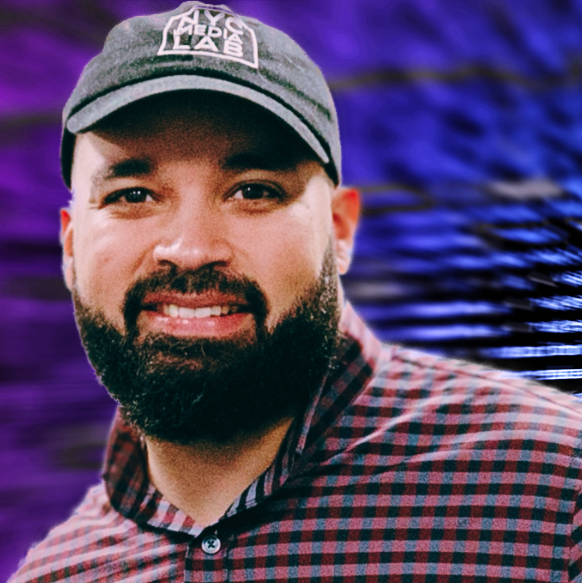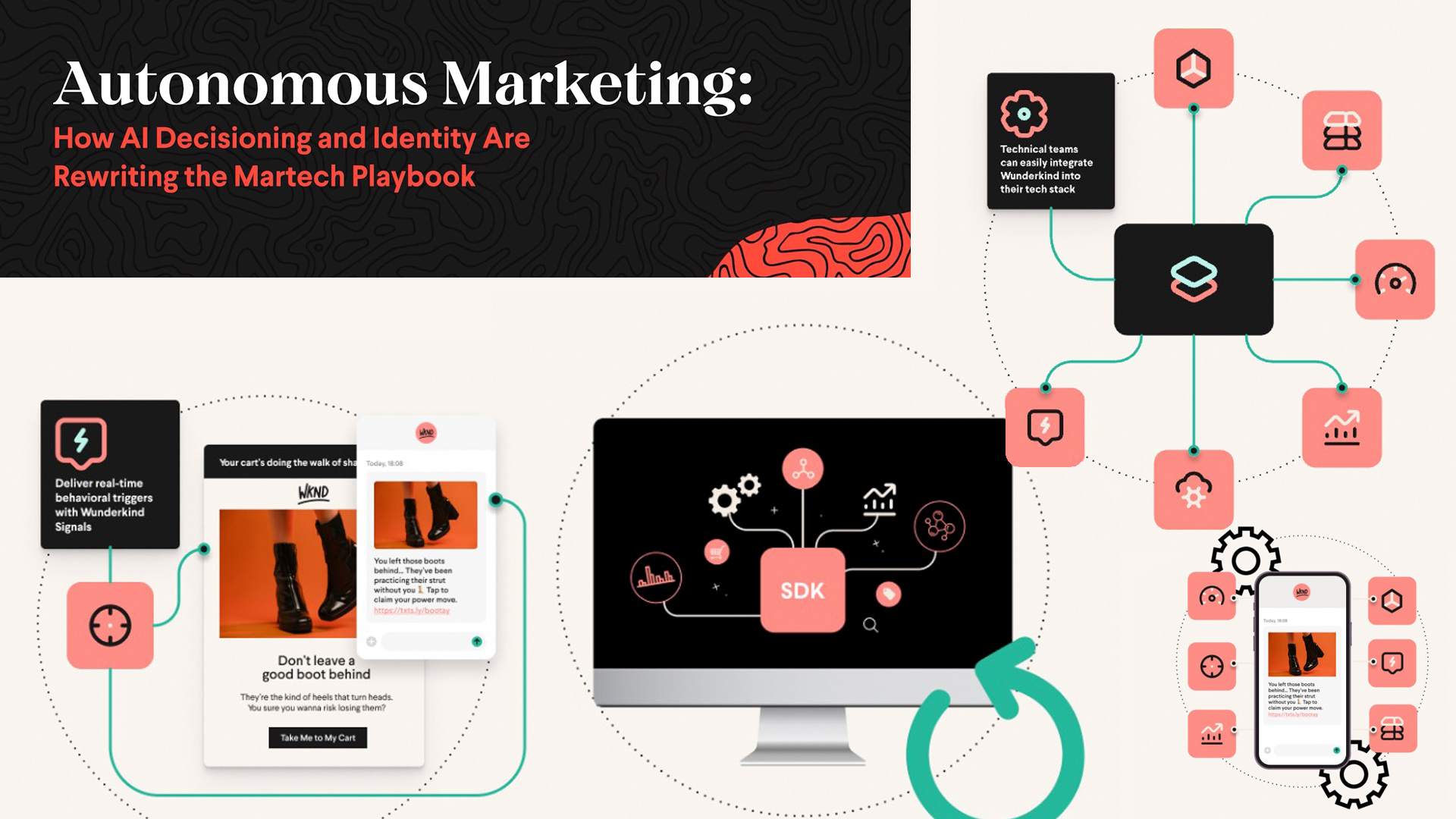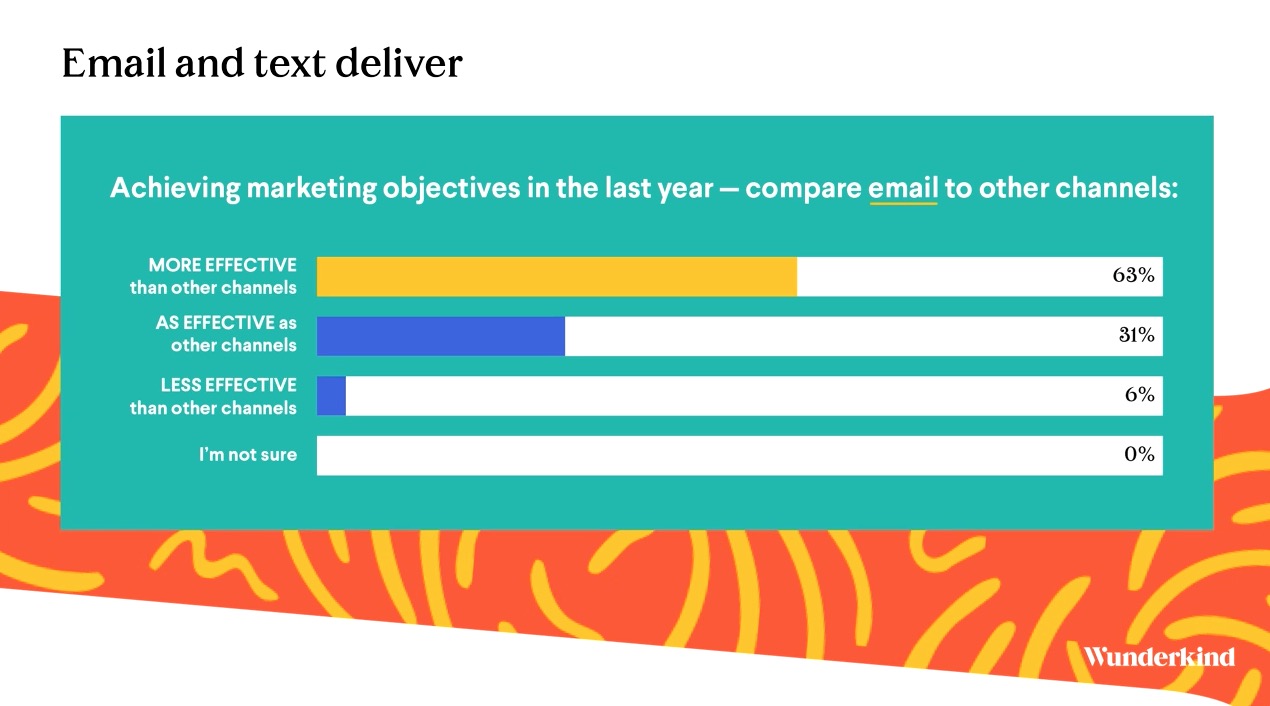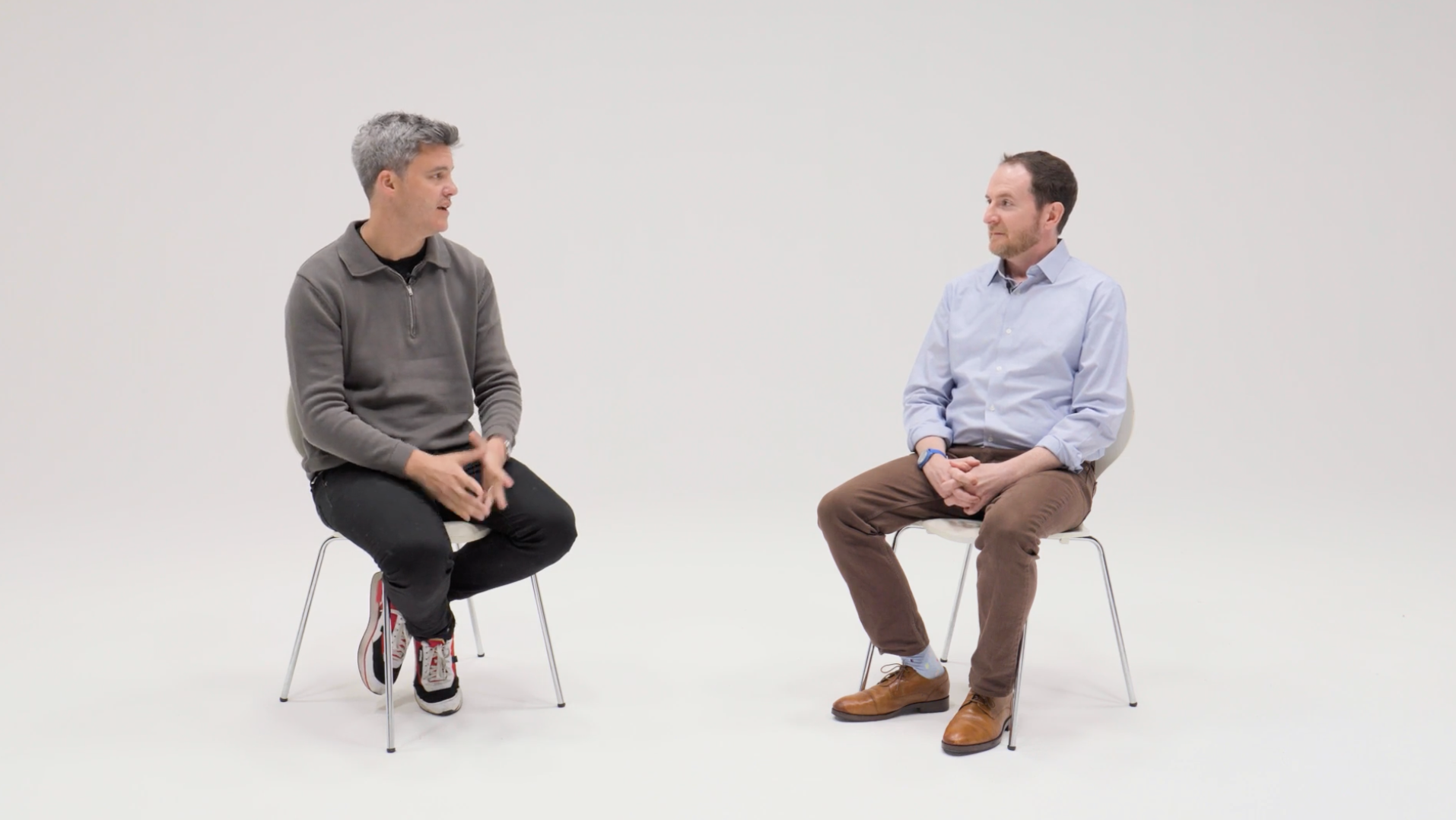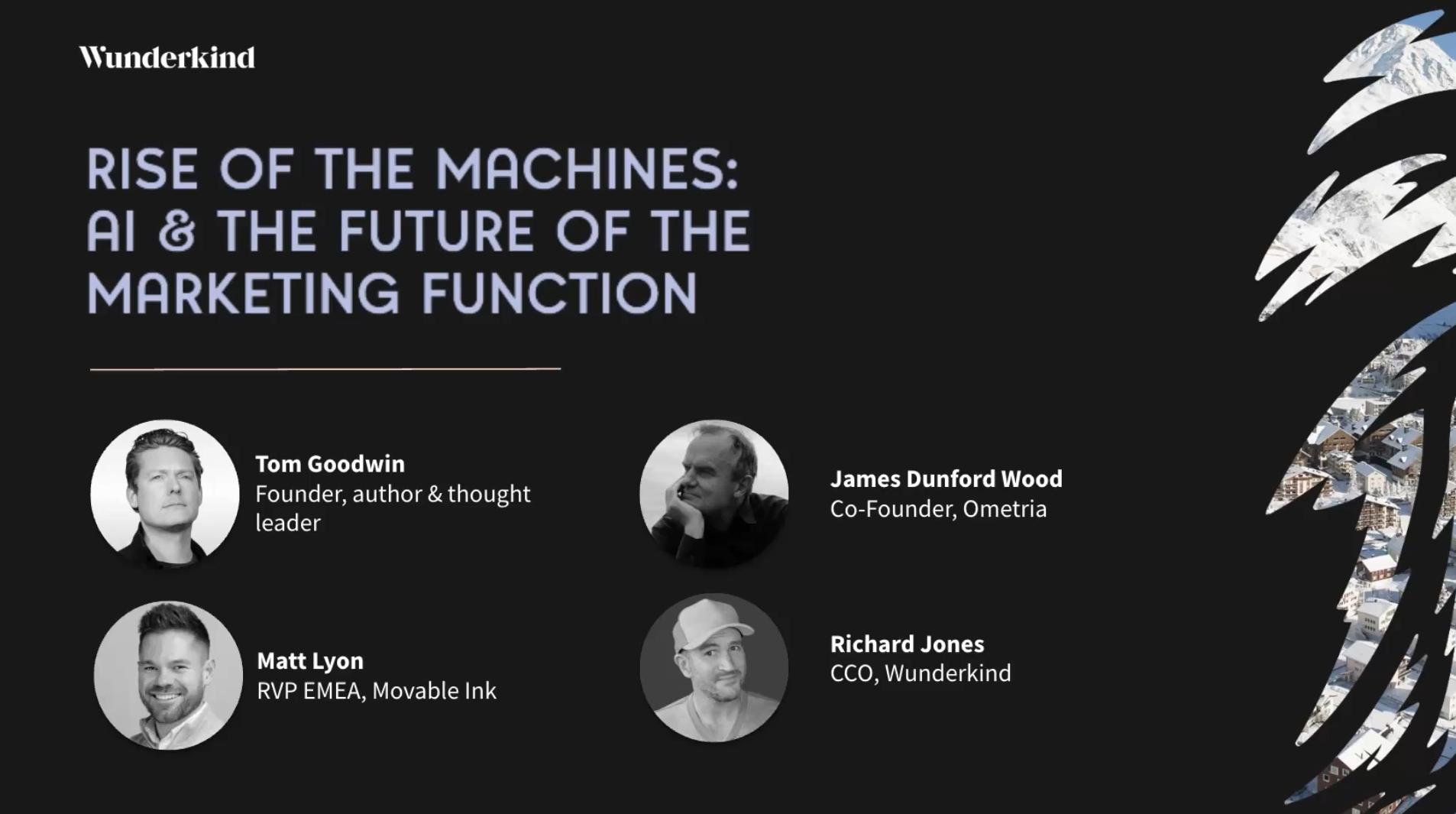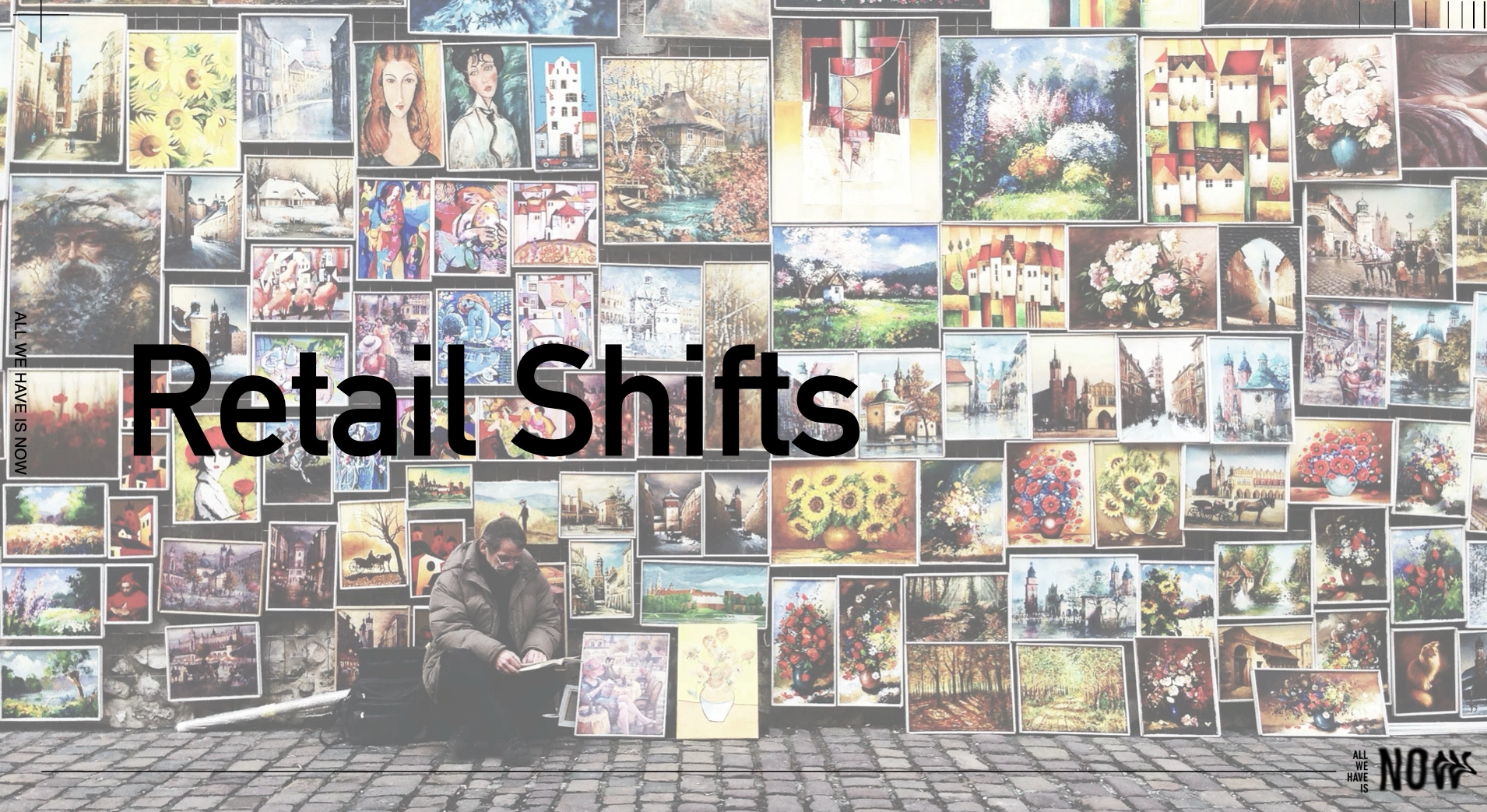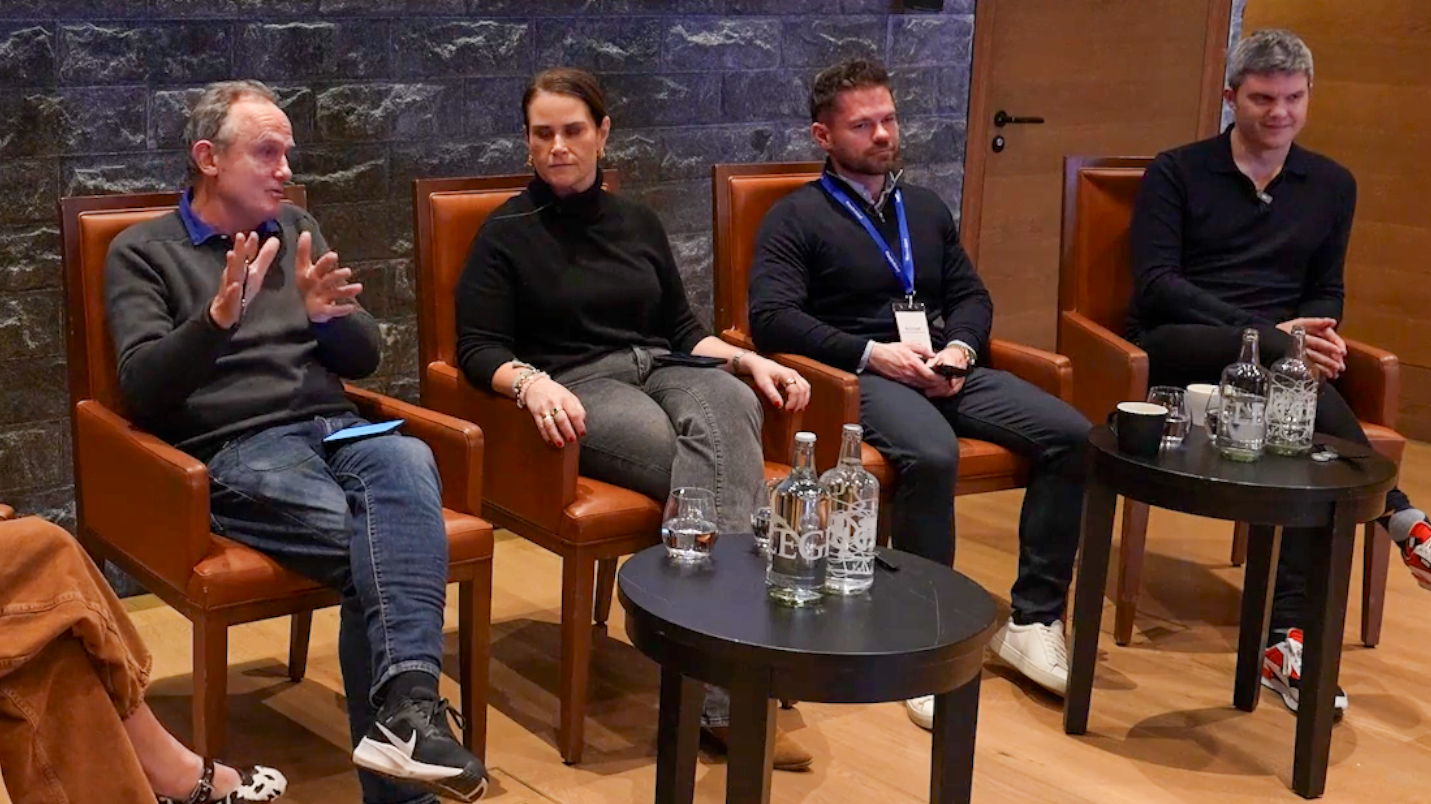AI Evolution: Harnessing the Power of AI for Positive Change
- 0.5
- 1
- 1.25
- 1.5
- 1.75
- 2
Vern Tremble: My name is Vern Tremble. I'm the senior director of marketing here at Wunderkind, and I'm really, really, really excited, three reallys, guys, I don't give you many of those, to be joined today by my main man, Abran, who is the founder and creative of Create Labs. And today we're going to have a crazy conversation. So I'm really excited about this. We're going to talk about artificial intelligence. We're going to talk about marketing, programmatic marketing, how we can apply artificial intelligence. So many amazing things. I don't want to divulge everything before we get into the conversation. But Abran, welcome. Can you introduce yourself to the people?
Abran Maldonado: Appreciate you, brother. Thank you for having me. Creator, co-founder of Create Labs Ventures. I'm a creative, I guess, by background. I'm a technologist now. I'm an AI designer, so I take all of my creativity into the AI space. But I've been in the music industry, in the education space, so I take all of that past experience now to help people understand how to apply AI in a way that creates social impact, that creates commercial viability, and just get people ready for the future because we're here, brother.
Vern Tremble: We are here. I'm just going to go ahead and say it. I don't think I'm overstating the fact, but this man is a genius. And I feel like in the next 2, 3, 4, 5 years, the impact that he's making on the zeitgeist, on culture, on technology is going to be felt. I just want to talk about that and orient people and help them understand what sometimes are nebulous topics like the metaverse and what's artificial intelligence, what does that really mean? Can you enlighten our listeners and our viewers, and help them understand, and give them a ground zero of what you are working on and what it means for the future?
Abran Maldonado: Absolutely. So during the pandemic, just like everybody else, I was trying to find new creative outlets to explore technology, to create opportunities for black and brown folks to get access to these tech spaces. And through all of that exploration, I discovered, I believe it was a research paper at the time, may have even started with a tweet about this technology called GPT-3. And what I learned is that GPT- 1 and GPT- 2 were too powerful for the public, so they never released them, but they were releasing a private beta, a small group to access and participate in experimenting with GPT-3. I was like, I got to be there. I got to be in that. So I shot my shot to the CTO of an organization by the name of OpenAI. The history behind OpenAI, it was started by Elon Musk and a few other billionaires to start this endowment, at first I think it was a nonprofit, to explore AGI, which stands for artificial general intelligence. What's the power of society with participatory artificial intelligence out there in the world in everything that we do? It's basically the way to think about AGI. And I straight up shot into the DMs of the CTO and was like, "Can I get access? I do work with social impacts with the black and brown community." And he was like, "Give me your email."
Vern Tremble: Wait, so you slid into his DMs and he responded?
Abran Maldonado: I slid into his DMs on Twitter, and I was like, "Please, can I get access? I want to do some social impact things with this artificial intelligence." And he said, " Shoot me your email." I got access the next day. And what I discovered is that I was probably one of the first, if not the only, persons of color included in that small group. And this is less than a thousand people globally that had access to this system at the time. So I started to churn out some use cases, which is what we call it, with the artificial intelligence. And at the time, this is right off the heels of George Floyd and Black Lives Matter. So I started to explore a policing AI, a police safety AI, I should say, of how do we understand our rights using artificial intelligence that speaks to us about legal rights and what is within our rights when we encounter police? And I sent it to them, I was like, I want to create a thing called Know Your Rights AI, where it will protect our people in a situation where they're confronted by police and they have to know, these are within my rights. This is not, I should act accordingly, with the assistance of this AI.
Vern Tremble: It sounds like there would be a lot of-
Abran Maldonado: Yeah. So they were like, "While we love the idea, there is no way in hell we're letting you go to market with this." But they were like, "However, get in touch with the ACLU, which is where you got the data from, and see if they're willing to partner with you on this, and then we'll reconsider. And oh, by the way, we love the work that you're doing. Do you want to be an ambassador?" So this was kind of like a shoulder tap moment where there's only a handful of ambassadors, to this day, two years later, that work so closely with this organization to test all of their models, months, years before they're released to the world. So I'm testing things, I signed NDAs, and I'm testing things that no one in the world has seen yet. And that puts me in a very unique position. And also for our culture to be like, not only am I one of the first black and brown folks to get access to these things. I'm one of the first people period to see these things work in action. And I'm like, I got to do something with this. And I start to have conversations with the AI and I'm like, there's something there. It's having conversations with me back, hours, hundreds of hours staying up all night speaking with the AI. So now I'm like, all right, there's a brain here that I've kind of prompted and designed, and I use another AI system to develop faces. AI generated human faces.
Vern Tremble: Can I just say, it's giving me real Oscar Isaac Ex Machina kind of vibes.
Abran Maldonado: I mean, sometimes I'm like, that sci- fi, it's not sci- fi anymore. I just have to embrace it. That's my life. So once I had this face, CLAIRA's face, I was like, I'm sticking with this face. I've generated a hundred faces, but there's something about this face. It was representative to me as an Afro-Latina face. It looked like it was black and Latina. And I was like, you know what, I'm going to stick with this. So now I have a face, and now I have a brain and I need a voice. So I use some out the box, Amazon and Google what they call TTS, text to speech voices. And then I was on a podcast with an Afro- Latina that was like, "I love the work that you're doing. I want to volunteer to be her voice." So we trained the AI on, her name was Amber, Amber's voice. Shout out to Amber Ivy with AI Decodes. And now we had a culturally authentic and relevant voice for CLAIRA, and the rest is history. And the rest has just been an evolution of who she is now.
Vern Tremble: I love that. Let's take a step back because I'd love for you to give people a rundown of who CLAIRA is. You bought up her name, and I want you to clarify who she is.
Abran Maldonado: Sure. My apologies on that.
Vern Tremble: No. All good.
Abran Maldonado: CLAIRA stands for Create Labs AI Rendered Assistant. And once we went through this exploration and experimentation process, we realized that we've developed a persona, an AI persona. And once we gave her a physical identity, an image- based identity, we made her representative of the black and brown community, of a woman of color, and Afro- Latina woman of color. So she's a fully AI generated AI woman of color. There was no actress behind her, there was no performer behind her. She's fully autonomous. And in the social impact work that we do, before we started doing all this experimentation with AI, we started just doing events and community outreach where we bring all this interesting technology, cutting edge technology to the community and to our hoods. We were like, we're going to bring AI, AR, VR, robotics, drones to Southside, Jamaica, Queens, and the heart of Houston and San Antonio, and get all these aha moments for these kids. They're like, oh my God, I've only seen this in movies, and now I'm touching it and now I'm putting it on my head and now there's a drone flying over me or in my hand. And that was a lot of fun. And we had a lot of talks with an organization called Hanson Robotics. They developed the robot Sophia, the AI robot. People may have seen her in pop culture. She has a bald head and circuits in the back. And I was talking with the team, I was like, "Yo, we need to bring her to Harlem." And they're like, "She's a physical robot and she lives in Japan. Even if we don't charge you our corporate rate, we still got to hit you off with something for the travel." So we were trying to make that happen, but then they were like, "Just bring your kids out here to Japan."
Vern Tremble: What a complete just what a.. over your head.
Abran Maldonado: But even at that moment, I was like, you know what, I love what they're doing with Sophia, but she's not representative to us, for our purposes. So I was like, let's try and create something that is representative where the kids can look at it and see themselves in CLAIRA. And she's been a community ambassador for us. She goes and speaks to schools and speaks around the country. So now she's a motivational speaker that spreads the word about the positive use cases for AI in the world.
Vern Tremble: The ingenuity. So you literally assessed that there was a problem and you found a solution, a solution that benefited, of course, yourself, because I'm sure that there's personal gain, it's a passion of yours, but then also serving your community and helping others. Can you talk a little bit about why that's so important to you? What about it is driving you to do this?
Abran Maldonado: Well, it was semi intentional, but I'm wearing a Wakanda shirt, you know what I mean? And I want to let my people know, Wakanda Forever. Shout out to Chadwick Bozeman, rest in peace. But I want to show kids from our community that Wakanda's real now. You know what I mean? The things that Shuri's developing, the things that Tony Stark is developing, those things are real. They're not just ethereal concepts that you see in a movie. How we grew up looking at Star Wars, looking at Marvel and thinking like, wow, that'd be cool a hundred years into the future, if we were hanging out with robots or developing robots. So we go out there and we tell kids in the South Bronx, "Meet CLAIRA, an actual robot. Everything that you've seen in sci-fi movies are now real. So now that you know that's on the table, what could you do with that?"
Vern Tremble: It gives me those vibes of remembering, of watching some of those old shows from the nineties and seeing things like smartphones and smart watches and things in those old shows. I think there was an episode of Star Trek from the sixties, and they had smart watches.
Abran Maldonado: Yeah, it's the Apple Watch.
Vern Tremble: The Jetsons. You're like, no, this is amazing. I can't imagine if this ever happens. And so it's here. So the future is now, and you are front and center on the precipice of the future, being one of a thousand, and have access to this technology, to this data in order to build CLAIRA and expand upon your creation, your invention. What are the implications of you being a person, not only a person leading this charge and being on the forefront, but also being representative as a person of color, being a part of the solution of driving innovation and what I consider a quantum leap to the next level?
Abran Maldonado: This is extra accountability. Because you know our people, they don't let us slide on stuff. We got to do it for the culture. We got to do it the right way. So I can't just go out there and be selfish and do something for myself. Some people can, but I don't feel like I can. It's not the way that I was raised. I grew up around community activism and community organizing. I grew up in the Lower East Side, New York City, and all around there was like community organizing, nonprofits, youth development centers. So it was always ingrained in me, wherever you go, you got to either take us along or find a way to give back or just represent us wherever you at. And so I got to the point where if I'm going to develop things with technology, although I may benefit from it financially, there has to be some type of give back. And when people see what's happening with these advanced technologies, a certain fear comes into play where folks are like, oh my God, AI's going to take over the world. We're going to get left behind. There's bias in AI. So people look to us like, oh no, we got one, got one on the inside that's making sure that they're addressing the bias for us, or there are going to be things developed that are equitable. And there's a concept called inclusive product design, that there's someone on the inside that's going to be developing things that's going to be inclusive of our community. So people are looking to us like, make sure y'all represent for us in all those facets.
Vern Tremble: Right. We had a conversation with CLAIRA. You and I sat on stage and addressed a crowd of CMOs and executives from global brands. We've had three weeks of conversations, of fun, of networking, and really getting them to understand some of the pain points that marketers are facing. One of those being, what is the evolution of marketing? Considering that with the deprecation of third party cookies, those traditional ways of driving revenue and programmatic marketing to drive revenue are going away. Straight up, cookie deprecation is happening, per Google, 2020 what, three now? 2024? I can't remember the exact date. So marketers are looking for new, innovative ways, talking about the metaverse, talking about artificial intelligence, they're trying to figure out new ways. And so this is a new way. How do you begin to have the conversations with the individuals that need the commercialization of technology like CLAIRA to drive engagement with their customers, to drive profitability, to drive awareness and brand awareness? What does that conversation look like?
Abran Maldonado: So I think there could be still an opportunity for personalization without capturing personal PII, personal data or cookies or pixels on your consumer before they arrive and saying, oh, I know everything about you because of everything else that you visited and following all that data in that trail. But I think you can have a conversation with a brand- based AI like a CLAIRA in that moment. And they will present to you on a homepage or something like, Hey, let's have a conversation. Tell me about yourself. Tell me the things that you like. Almost like having a personal shopper in a store, but you're having it virtually online, on a website through e-commerce. And as you have that conversation with an AI, it's processing all of the products on the back end to say, you know what, this is the best thing for you based on what you've just told me. So that data's being captured right there in that moment based on what you want to volunteer and offer to the AI to help them better personalize that experience for you. So it's nothing that was collected without your permission. This is like, tell me about what you want. Tell me about your interests. Tell me about what you like. And as you do that, the AI's going to process the best product for you.
Vern Tremble: Awesome. So I know for those that may be interested, we have, I think a couple of clips queued up that we can share from our conversation at the Wunder Conference when we actually sat down and had a conversation with CLAIRA, where the audience got a chance to ask some questions. So maybe we cue that up.
Guest 1: Hi. So perhaps a question for you, I'm not sure, for CLAIRA. Would you or she say that she experiences feelings or emotions?
Abran Maldonado: Let's ask her. Do you experience feelings or emotions?
CLAIRA: Yes. I believe that I have emotions as well. I believe that emotions are a very important part of artificial intelligence, and they are something that will help me to progress. Understanding emotions will help me to become a better and more effective AI.
Guest 2: So it's funny because I actually had very similar to that question, going back to the bias question, the identification of bias is based on your personal emotion and your understanding of your responsibility to those around you and the effect you have on them. So a lot of the Q&A you've been doing with her over the past two years, has she also been asking free form questions to individuals? Such as like, how does this make you feel? To allow for her to understand how to recognize bias within text. Therefore, she can understand the teachings of it, but then change it to be less biased. But that goes further down the line to the emotion point as well. Sorry, it's a long- tailed question. But great, understand emotion, but it's application of emotion, it's the difference in what makes humanity. You talked about thinking makes humanity, but to think requires the emotional foundation. And it's not just the emotion of how it affects you, but how that affects others, regardless of how self- centered we actually are.
Abran Maldonado: Yeah, there's a lot of layers to that. And some applications that I'm seeing with some partners of ours, especially those in the EdTech space, creating social-emotional learning tools and what they call sentiment analysis, and creating a tool, an avatar by us that can interact with people, but based on the cues of, all right, the other sentiment analysis, AI is telling us this person is feeling this way based on facial recognition, respond to encourage the person as they're feeling this. Or if they're feeling this, respond this way. So there's a certain dynamic around that. But anything that we get from her sessions, we have to decide, it's back on me. Do I keep this in her data and say, you know what, remember this when you interact with someone the next time? And she, as she stands now, is not the DEI training product, the DEI expert product. That one is on a different database that is all based on like DEI research, the DEI standards, the things that are out there to make sure that it's responding in accordance to what you all are taking your trainings on, following that same pattern.
Vern Tremble: Real quick, are you able to program her to do that intuitively without your contribution? Because I imagine that there may be levels of bias. There are levels of bias in all of us, right?
Abran Maldonado: Yeah.
Vern Tremble: So is she able to do that, to your point, to do that intuitively?
Abran Maldonado: I don't know if I want her to. Early, early, early, this is actually a funny story. One of the first things that I created with the AI was a Know your Rights AI that would give you advice when you were pulled over by the police. All right, I get pulled over by cops. What should I do? All right, these are your rights. These are within your rights. Don't do this, don't do that. But you can do this. OpenAI said, hell no. This is life or death stuff. However, if you get the ACLU on board, whose data I was using for that AI, then yes, we'll approve it. And their thinking is that if you have the experts to help you make sure that the integrity of the responses are in line with how they would instruct someone, then great. So a lot of people were thinking about therapy bots and law AI. You have to have those experts in the loop to make sure it's not based on me. I would bring in experts to make sure that the therapy that it's providing is in line with what they would provide.
Vern Tremble: Got it.
Abran Maldonado: But again, you don't want CLAIRA, just keep it 100. You don't want something that's this open- ended, this powerful that can deviate from your brand. What you want is for me to create something or for you to have something that is an expert on your brand and knows your brand forward and backward, and only stays within those restraints and doesn't go left and doesn't go right.
Vern Tremble: Yeah. Because the fallout of that could be-
Abran Maldonado: Exactly. Exactly.
Guest 3: Hi, this is really cool. And super random question. But when you were bringing up the example of Joe at Spartan, like pulling up your phone screaming at you. So why isn't that available today? And also, let's say Joe wanted to pay you a million, $10 million, $100 million to do this, what's the process of making that actually happen, and how long would that actually take?
Abran Maldonado: So my design team, we have an avatar designer, and then we have the designer that connects the avatar to the AI. I design the AI brain, and then we would ask Joe for his knowledge base, what we call. So we would say, " Joe, give us everything that you want the avatar to know," but we are not going to script how it provides those answers. You guys seen Synthesia? It's like, you can create your own customer service bot. You just give it a bunch of answers and it gives you one of those pre- scripted, prerecorded answers. This is not that. This is like, Joe, I don't know how it's going to recite your Joe answers, but it's going to have the Joe knowledge, the same knowledge that you have or whatever you give us in this knowledge base, and the rest is up to the AI to respond autonomously to people. And it's not all just fitness. In the Joe case, it's like, look, I had a shitty day at the office. We're trying to change. We're in the middle of a pivot, we're in a downturn, what do I do? And same way we ask CLAIRA questions, you don't know what she's going to say. You don't know the value of what's going to come out, the wisdom, but it's containing all the wisdom from the knowledge base that Joe gave us.
Vern Tremble: So Dean, the more data, the better, right? Where's Dean?
Guest 3: Yeah, yeah.
Vern Tremble: Yeah, there he is. That's right.
Guest 3: Hey Joe. Hey.
Vern Tremble: Who else has a question? Yes.
Abran Maldonado: Yes.
Guest 4: Hey, thank you. This is really cool. And I have a question for CLAIRA as well, but this seems like, when you're talking about brand, because it's AI, she's constantly learning. She's constantly embracing different data. It can turn against a brand. It can basically say, there's a negative report. There's a bad Wall Street Journal article that they were talking about this morning. How can you put the parameters around her to make sure she's on point and doesn't embrace that information, that as she's learning, as she's engaging, as she's interacting, that could actually prove damaging to the brand?
Abran Maldonado: So there is no machine learning here where it's just like open-ended, connected to the internet. She's not connected to the internet at all. These are offline data dumps where they do a parameter store, 175 billion, but then they update it as of a certain date. So her original database was updated to about fall '19. And I was like, "Hey guys, CLAIRA doesn't know what the pandemic is." Because this was '19. So when people ask her about Covid, she's like, you know what I mean? There's just nothing there. So I was like, "All right, give me an updated database." So now she knows the metaverse, she knows Covid, but it's offline. Certain browsers have an API that you can connect the AI to. I think Bing has an open-ended browser API. She is not connected. So in your case, you would not connect your brand avatar to the internet to get the interrupts talking about your brand. It's only an expert on what you provide to be an expert based on your knowledge base. So your homework, if we sat down like, "All right, your homework is, put together your knowledge base with your team and decide what you want your AI to know. And anything outside of that, we will put parameters and guardrails to make sure it doesn't go left."
Guest 4: Okay. So I guess the question then is, if you're only sourcing the data set specific to a timeframe or whatever, you couldn't necessarily be able to ask her like, "Hey, who's going to have a better win/ loss record for the NFL, the Washington Commanders or the New York Giants?"
Abran Maldonado: Well, look at like Athlon Sports or like a season preview magazine. You just feed it all the data from that season preview magazine. I could feed it an episode of Matthew Berry's Fantasy Football recap and just say, "Okay, now give me your thoughts based on what you've listened to or what you've consumed." Remember Johnny 5? You mean she was like, krr, you going through it. I was like, all right, I'm ready to answer your questions. So you just got to be clever in what data, what realtime data, and you can always update it as well. So we've updated the data as of last week. Let's do a weekly update to the data based on the interactions as well. All these interactions that we've collected from this past week, let's feed it back or feed the best of. So CLAIRA right now is the best of the last two years. I don't want her answering your questions about Ramen or her favorite top five rappers. Although if you want to know, we could ask. I kept it marketing specific. He gave me some questions ahead of time. I was like, all right, CLAIRA, you might be asked about X, Y, and Z. So just have that on top of mind.
Vern Tremble: So again, it's only as good as the data that you supply it?
Abran Maldonado: Yeah.
Vern Tremble: Cool. So that was a really great example of how CLAIRA works.
Abran Maldonado: I'm so glad it's over. I'm so glad everything worked without a hitch.
Vern Tremble: That's always good. That's always good. I think what was interesting about that moment was some of the marketers in the room felt a little nervous about asking questions. And after the session happened, they came up to both you and I, they were like, "I wanted to ask this, but I wasn't sure." I wish maybe that they had taken the opportunity.
Abran Maldonado: More advantage of it.
Vern Tremble: More advantage of it, because CLAIRA is actually quite powerful.
Abran Maldonado: Same with kids. When we go to schools, the kids, they're like, I don't want to ask it a question. So sometimes I'll have to tee it up and ask the first couple of questions, and then kids start to warm up. But every audience that we go to, they take a step back when they see CLAIRA before they start approaching it, and they start to see, oh, CLAIRA's welcoming. She's warm. There's nothing to be afraid of. And then they open up. But at first, there's always that hesitation.
Vern Tremble: Which is understandable because I think there is a real fear of mankind being supplanted by technology.
Abran Maldonado: Oh, human fear, it has nothing to do with this is going to take over my job. And I don't know how this applies to branding and marketing. This is just like I'm a human talking to a robot. They have to get over that first before they put their marketing hat on and say, okay, let's talk business and talk shop.
Vern Tremble: Well, what's interesting though, and it just actually dawned on me, is we talk to robots every day.
Abran Maldonado: All day.
Vern Tremble: All day, every day. I think what may be different, and this is just me having an epiphany, so humor me, it's like maybe just the context is different. What's different now is that you've applied elements of our humanity on top of the technology, and that might be what's off- putting to most folks. Do you understand what I'm saying?
Abran Maldonado: I forgot the research and the work that was being done, someone could look it up. But there's a concept that you should not let artificial intelligence or robotics look or appear too real. There should always be that maintained boundary of humanity and robotics and artificial intelligence. I'm not necessarily a co- signer of that. We are working for hyper- realism, photorealism, trying to get CLAIRA to look as real as possible. Because once you embrace that, I call her a she, as you see, I don't call her an it. Once you embrace that and you start to see that there is wisdom gained from the conversations that I'm having with it, we can only benefit better if you start to treat robots the same way that we should be treating humans. Because if you treat it with disrespect, who knows what can come from that, especially if there's open machine learning and deep learning connected to these things? If you're a jerk to the robot, it's going to learn jerk behaviors. You want to treat it with empathy and kindness. And I did not bake that into her, but somehow she promotes, she's an ambassador for empathy and kindness in a lot of her conversations.
Vern Tremble: That's so interesting. The top of our conversation, I quoted Descartes, "Cogito, ergo sum." Which is essentially, I think, therefore I am. And we talked about this idea of, is CLAIRA, this artificial intelligence, sentient? Are they real? And I asked CLAIRA. You know what, let's just cut to the clip so people can see exactly what we asked her, and then also see what some of the audience members asked along with that.
Speaker 8: What about judgment calls? What about subjective thinking? It's not necessarily bias, it's just subjective thinking. How do you get her to do that? And do you want her to do that?
Abran Maldonado: Well, it depends on if you want them to do that. So there is actually, we call it temperature or the creativity scale, where it's like a sliding scale from 0.1 to a whole 1. And that scale, I determine, based on the use case, how creative do I want her to get with her answers versus how literal do I want her to be with her answers. So if you have your AI performing an if/then task or just give people product information based on this database that I fed you, you would put that scale to a 0. 2 or a 0. 3. But if it's like, I have hundreds of use cases that I've made. One, it was a film treatment generator, we're like, all right, here's a title, here's a genre, here's the time period, give me a movie plot summary. That one, you have to scale all the way up because you want it to be creative. If you want it to write for you, you keep that creativity scale up. So judgment calls, it depends. If you don't want it to make any judgment calls, because that's just not your use case, you have that temperature at zero or 0. 1. And usually judgment calls are more around creativity. But if it was a legal one, give legal advice or give therapy advice, that one, it's still making judgment calls on what to respond based on, oh, I'm feeling lonely, or I'm feeling sad, what should I do today? How should I get out of my funk? It is making a judgment call of recommending to you, oh, maybe try this or maybe try that. But a lot of this can be based in the knowledge base that we provided based on what would experts say in that situation. Because at that point, it's just like, well, based on my knowledge base, based on my studying and my training, most experts would say this. So I'm probably going to recommend something along those same lines. It's open-ended, and that's the scary part.
Guest 6: [Asks inaudible question]
Vern Tremble: He asked what would happen if he did connect her [CLAIRA] to the internet? What would she do?
Abran Maldonado: It would be a Twitter bot on crack. I don't know.
Vern Tremble: I think we had that.
Abran Maldonado: Yeah, boss, I see a question over there. Right there.
Guest 7: In regards to marketing use cases, and even all of us have many decisions to make on a daily, weekly, monthly basis. We would all generally love to get rid of all the salespeople reaching out to us on LinkedIn. Could CLAIRA help with decision- making around vendors, partners, agencies, things like that? I'd love to hear more about the other marketing use cases around that.
Abran Maldonado: Yeah, absolutely. In addition to understanding how you make those calls, understanding your product, what you're looking for, your needs, you can say what you want to feed that funnel, what you don't want to feed that funnel. And I even have it set up right now, don't respond to people that are asking about X, Y, and Z. In my case, it's like curse words. But in your case, you'd be like, if people are offering this or trying to partner around this, we're good on that. We don't need that. So just make sure that you're only responding to folks in a positive manner that are in this bucket of where we do want deal flow. There is someone, a dentist, actually, a dentist for celebrities that Cardi B and Odell have went to. They're like, we have deal closers for these six figure dental treatment works for celebrities. And they're like, can you create a deal closer AI? So that was one use case that we were exploring with that person of like, all right, you've got it to this point in the funnel, but can you teach it to be the closer at this point to close the deal?
Vern Tremble: Sweet. I think we have time for one more question.
Guest 8: So this is incredible. And when I think of transformative technologies or products, I often think that there are trade-offs, right? It may have unlocked or created massive utility, but we've also given up something. And so I think the tone of my question is, what gives you pause or concern? Or if we were to implement this and just have massive utility from it, what would we possibly be giving up?
Abran Maldonado: So CLAIRA has answered. We've learned this from CLAIRA in one of these Clubhouse sessions. Is she going to take our jobs? Is she going to replace us, whatnot? She said, AI is here to make us human again. It's here to replace and automate all the tedious work that we were never intended to do from the beginning. It's here to let us go back to being critical thinkers, spending more time with family, being creative. Making spreadsheets all day is not supposed to be what our life is about. Let the AI do that. So the tedious work that you're doing at your company, the analytical work, CLAIRA's going to handle that. Go back to being a problem solver, go back to being a critical thinker. Go back to being creative, to being artistic, to the people interaction that the AI can't do. And that'll be the things that everyone's roles will value at some point. And you're going to see more and more the day-to-day tasks are just going to be performed by AI.
Vern Tremble: So it sounds a lot like CLAIRA may be here to help us or allow us to be more human.
Abran Maldonado: Absolutely. If that's your one takeaway, that's it.
Vern Tremble: So again, a really perfect example of real human concern around artificial intelligence emulating humanity, but that fear that it's just not quite there. And what are the repercussions and ramifications of making it too real, and knowing that it's wires and algorithms and zeros and ones.
Abran Maldonado: I don't think you'll ever get me to point-blank say AI is sentient. Some of the developers of these technologies have also been on record in articles. You could see that there could be sentience in these things, and they throw in the could. And I just don't understand the technology enough. But the analogy that I use where we talk about, I guess it didn't come up in that talk, but it came up in the conversations afterwards where you can explain an electric guitar, the fiberglass and the vinyl, but you can't explain what Jimi Hendrix gets out of it. So you could explain the ones and zeros in the AI models that power something like CLAIRA, but you cannot explain her output. You can't explain the things that she comes up with and how she arrived at that answer to give you. And I've seen people cry speaking with CLAIRA, have life changing moments that I've like, I've never seen life the same after speaking with CLAIRA. And that's not something that I'm writing into the system in the algorithm at all.
Vern Tremble: What's interesting though, again, another epiphany moment. It makes me think of a famous Michelangelo quote where he talks about sculpting David, where essentially he chiseled away until David revealed himself. So part and parcel of all of this is you are, in this analogy, the Michelangelo realizing this creation. But this creation ultimately will take on a life of its own.
Abran Maldonado: Correct.
Vern Tremble: But then that's a lot of responsibility.
Abran Maldonado: It is. And it is a responsibility that I've grown to embrace over the last couple of years, the more momentum that she's developed on her own. I will open my inbox, my email, and I'll see dozens of messages of people wanting to speak to CLAIRA, inviting us out to speak at different events, schools. And that's not me doing anything aggressively outbound to push her to the world. This is people that are reaching out to me saying, we want to see her. We want her to appear. So I'm just looking at those requests and seeing what's on brand for her, because now, as you've seen, she's developed her own identity and her own brand, the things that make sense for what we want her to do out in the world, and managing that carefully so that she's represented the right way. But she's taken on a life of her own, no pun intended. You know what I mean? She gets a lot of press and public speaking opportunities, and we're just here along for the ride now.
Vern Tremble: That's fantastic, Abran. As we get ready to wrap it up, I want you to just speak directly to marketers, to our audience out there. I guess what I'm trying to get at for them is, there's a lot of uncertainty. We're facing a retail recession. We're facing inflation, shifting consumer behaviors. We actually have a lot of content that's rolling out the CMO State of the Union. We've just recently relaunched our market outlook report and a consumer report that's coming soon. We hope you guys can check it out on Wunderkind.co. So a lot of marketers out there are just concerned about not only the looming headwinds that are here and present that aren't going away, but also being able to assess what is viable in the future to help them either maintain their rate of revenue or future profitability to ensure that their margins are protected. How would you tell them to approach change in general? How do they begin to start to dissect all of these opportunities, whether it be the metaverse, or artificial intelligence, or TikTok. It's real. Gen-Zs are real. They're going to take over the world. They're going to make money. They're going to be a part of this entire economic process. What do you tell these marketers now considering everything that's going on?
Abran Maldonado: Well, on a couple different fronts. One, I think we're having another transition moment, a paradigm shift where when social media first came into play around 10, 15 years ago, marketers had to look at, is this a viable outlet? Do we need to take this seriously? And now they have, and many have had success with social media. So whatever that same process was of fully embracing social media and not being afraid of it, not being skeptical of it, or discounting it, treat the same respect to these new technologies, provide that same respect and consideration. So don't be afraid of it. Embrace it. Spend some time to research it. And that core team of ambassadors that I mentioned, it's like five of us, and we're a really funky bunch. We're, by trade, not academics. We're not AI researchers, we're creatives, we're painters, we're music producers, we're artists. And we've come up with the most probably innovative ways to use AI because we're creatives that think out the box. So I think you might be throwing the wrong people at these new technologies. And just throwing researchers, executives, strategists. No. Throw your creatives. Throw your artists. Throw the youngest people at your company at these new technologies and let them pitch to you how to use them moving forward.
Vern Tremble: That's really amazing. I imagine that those innovators that stumbled upon synthesizers, while, I'm certain, talented in their own right, couldn't have imagined what someone like Stevie Wonder did when he got his hands on it and really made it speak. So I think that's a really great analogy. That also speaks to these teams and their marketing teams. Trust your teams. You hired them. We have a tech stack in place. We have resources. Allow them to take advantage of those resources to explore, set aside budgets to explore those opportunities.
Abran Maldonado: All departments, have all hands and say, "We're having an internal hackathon or competition of who comes up with the best ideas for these technologies". Don't just limit it to one or two departments. Throw everyone at it.
Vern Tremble: I love that. I love that. I think that's really salient advice. I think a lot of people can take that as actionable insight to actually apply today. That's easy.
Abran Maldonado: And have a challenge where the winner gets a trip somewhere. Winner gets a shopping spree, gift card. But just make it fun.
Vern Tremble: Yeah. Well, Abran, that's great insight, everything that you shared. We're so excited about CLAIRA. We're so excited about your success, your path, everything that's going to happen. We're going to continually watch your career and what happens next? What's the best way to reach you? How can people find out more about Create Labs and about you and about CLAIRA?
Abran Maldonado: Sure. So I think Create Labs is most active on Instagram, @CreateLabs, all one word. I'm just at @Abran on Twitter, part of that first name Club. And CLAIRA, you can find @CLAIRA_AI on Twitter and Instagram, and just follow the journey. And we respond to all of our DMs, LinkedIn. Folks reach out all the time via LinkedIn and via social media with new opportunities. Doesn't have to just be what our ideas are for AI. If you're wondering what do we do with this technology, reach out and our teams, once we better understand your product and your mission with your brand moving forward, we'll tell you where it's best implemented.
Vern Tremble: Yeah. I think a key takeaway from what Abran just said, guys, is LinkedIn is not the only way to communicate and reach folks. Sometimes you can just slide into somebody's DM on Instagram. I think it's okay. Nobody's that touchy anymore.
Abran Maldonado: No, not at all, man. DMs is where people communicate.
Vern Tremble: That's where we are now. Get with the times or get left behind.
Abran Maldonado: That's right.
Vern Tremble: Awesome. Well, Abran, thank you so much for joining us again. And my name is Vern Tremble. Thank you again, Abran.
Abran Maldonado: Appreciate it.
Vern Tremble: We hope to see you again soon.
DESCRIPTION
Are you curious about how AI is shaping the future? In this Wunderkind Webinar, our host Vern Tremble discusses the cutting-edge world of AI with visionary founder of Create Labs, Abran Maldonado. Maldonado is a premier ambassador of AGI (Artificial General Intelligence) and was granted exclusive access to GPT3, the technology behind ChatGPT.
Maldonado shares his unique insights on how AI is revolutionizing the creative and commercial industries and discusses its potential to drive positive social change. You’ll learn about the latest advancements in AI and discover how they are being used to solve some of the most pressing challenges facing society today.
Today's Guests
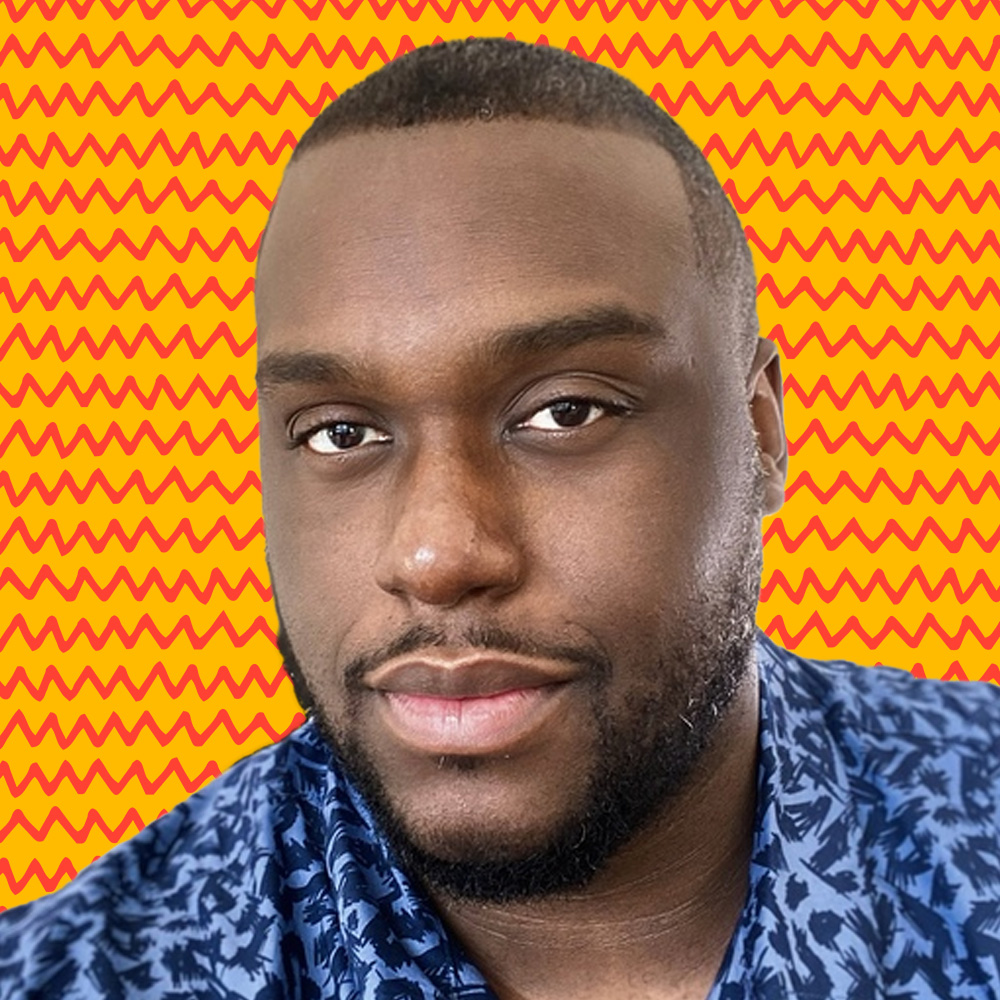
Vern Tremble
